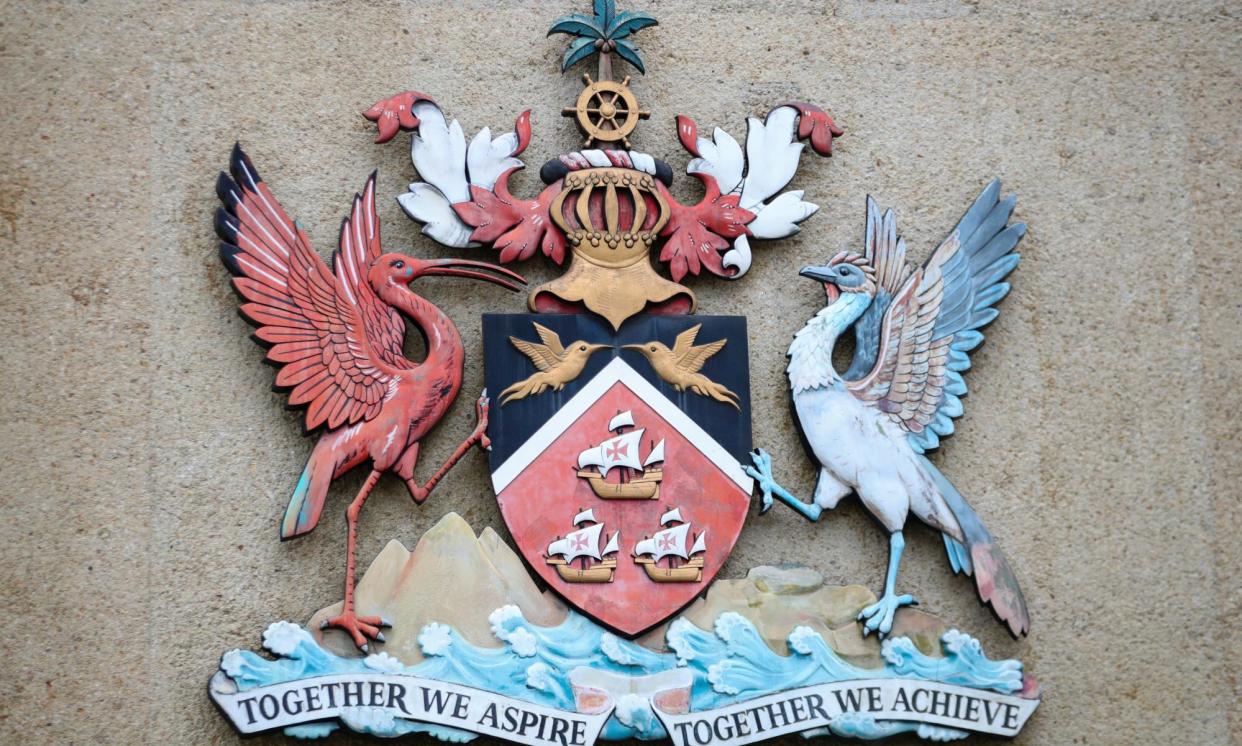Historian hails Trinidad plan to remove Columbus ships from coat of arms

The government of Trinidad and Tobago wants to remove a depiction of three ships used by Christopher Columbus from its coat of arms, in a move hailed by a historian as important in addressing historical inaccuracies and shrugging off colonial identities.
The Caribbean country’s prime minister, Keith Rowley, announced a plan on 18 August to replace the ships with a representation of Trinidad and Tobago’s national instrument, the steelpan.
The ships depicted are those used by Columbus in his expeditions to the Caribbean, which paved the way for centuries of European colonial rule and enslavement in the region.
In recent years, Caribbean countries have pushed back against what they see as a false narrative that Columbus discovered their islands, which, in fact, were populated when he arrived. Some have even removed references to the Italian explorer’s discovery in national holidays.
Related: Empire’s Crossroads review – ‘a strikingly assured history of the Caribbean’
But there has been public concern that removing the ships from the coat of arms would erase important moments from Trinidad and Tobago’s history.
Dr Claudius Fergus, a historian who chairs the National Committee on Reparations, said: “This is not an attack on the history of the Caribbean. It’s not an attempt to erase but rather to correct … Every generation has an obligation to reinterpret their history and to correct the falsehoods on which some of that history would have been written.”
The committee is a local arm of the Caricom Reparations Commission, a Caribbean-wide body that seeks justice and compensation from institutions and governments for crimes committed during the transatlantic slave trade.
A longtime advocate for the elimination of colonial icons from the country, Fergus welcomed the announcement as an important step toward purging its colonial identity.
Rowley received applause when he announced his decision to pursue the change at a convention for his People’s National Movement party.
He said: “You see the three Columbus boats in the emblem? They will go. And we have enough votes in the parliament to do it. I can announce now that as soon as the legislative adjustment is made, that amendment should be made before 24 September.”
Fergus described the replacement of the ships with the steelpan as significant. “The steelpan was born in Laventille, the margins of [the capital, Port of Spain] – some might call it the ghetto – and the steelpan from its birth faced extreme racism and class prejudices from the general society, the church, and from many governmental figures at the time … so it was a slow progress towards assistance until today where the steelpan is embraced,” he said.
Rowley’s announcement has divided public opinion in Trinidad and Tobago. In Woodford Square in Port of Spain, renowned as the place where the country’s first prime minister, Eric Williams, delivered some of his most important speeches, there were opposing views on the issue.
Roberto, who did not want to give his full name, felt the government should prioritise other issues. He said: “There are people living below the poverty line. That’s the first thing I would deal with.” He was also concerned about the potential effect on people’s knowledge of their history. He added: “If they remove that history, who will teach my children and my grandchildren their history?”
Brunan Tavernier, a telecommunications worker, described the issue of colonial identity as irrelevant. “It has nothing to do with crime or anything else that is going on in the country,” he said.
For others, removing the ships is an important decision. “It’s about time,” said Yafeu Iregi, adding that he hoped it signalled a change in the status quo for Caribbean islands.
The planned removal of the ships is just one part of the national debate on colonial identity. On Wednesday, a cabinet-appointed committee will review the placement of statues, monuments and signage in Trinidad and Tobago and will host a public consultation to gauge views on the issue.
Trinidad and Tobago’s announcement is part of a growing trend in Caribbean countries, which are shrugging off colonial identities and legacy structures. In 2022, Barbados removed the British monarch as head of state, with other Caribbean nations now reviewing the option of following suit.


